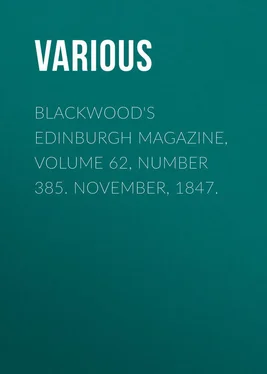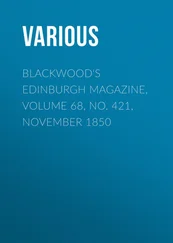Various - Blackwood's Edinburgh Magazine, Volume 62, Number 385. November, 1847.
Здесь есть возможность читать онлайн «Various - Blackwood's Edinburgh Magazine, Volume 62, Number 385. November, 1847.» — ознакомительный отрывок электронной книги совершенно бесплатно, а после прочтения отрывка купить полную версию. В некоторых случаях можно слушать аудио, скачать через торрент в формате fb2 и присутствует краткое содержание. Издательство: Иностранный паблик, Жанр: periodic, foreign_edu, Путешествия и география, на английском языке. Описание произведения, (предисловие) а так же отзывы посетителей доступны на портале библиотеки ЛибКат.
- Название:Blackwood's Edinburgh Magazine, Volume 62, Number 385. November, 1847.
- Автор:
- Издательство:Иностранный паблик
- Жанр:
- Год:неизвестен
- ISBN:нет данных
- Рейтинг книги:4 / 5. Голосов: 1
-
Избранное:Добавить в избранное
- Отзывы:
-
Ваша оценка:
- 80
- 1
- 2
- 3
- 4
- 5
Blackwood's Edinburgh Magazine, Volume 62, Number 385. November, 1847.: краткое содержание, описание и аннотация
Предлагаем к чтению аннотацию, описание, краткое содержание или предисловие (зависит от того, что написал сам автор книги «Blackwood's Edinburgh Magazine, Volume 62, Number 385. November, 1847.»). Если вы не нашли необходимую информацию о книге — напишите в комментариях, мы постараемся отыскать её.
Blackwood's Edinburgh Magazine, Volume 62, Number 385. November, 1847. — читать онлайн ознакомительный отрывок
Ниже представлен текст книги, разбитый по страницам. Система сохранения места последней прочитанной страницы, позволяет с удобством читать онлайн бесплатно книгу «Blackwood's Edinburgh Magazine, Volume 62, Number 385. November, 1847.», без необходимости каждый раз заново искать на чём Вы остановились. Поставьте закладку, и сможете в любой момент перейти на страницу, на которой закончили чтение.
Интервал:
Закладка:
"The man who was struck, after giving a start and a scream, showed the marks on his breast and arms to his companions; and then going to the water, and washing off the blood, seemed to think no more of it, but walked about with perfect unconcern."
Their spears exhibited a degree of ingenuity, which deserts them in every instance of supplying the better wants of life. Into a piece of bamboo, six feet three inches long, is inserted a piece of heavy wood, two feet seven inches long, the junction being very neatly and firmly secured with grass and gum. This piece of wood tapers to a point, on which is fastened an old nail, very sharp, and bent up, so as to serve for a barb; behind which, again, are two other barbs, made of the spines from the tail of the stingray. All these are so secured by fine grass and gum, that while quite firm against any ordinary resistance in entering the body, a much less force would tear them off, in endeavouring to withdraw the spear.
The beauty of some of the coral reefs occasionally excited great admiration.
"I had hitherto," observes the writer, "been rather disappointed by the coral reefs, so far as beauty was concerned; and though very wonderful, I had not seen in them much to admire. One day, however, on the lee side of one of the outer reefs, I had reason to change my opinion.
"In a small bight of the inner edge of the reef was a sheltered nook, where every coral was in full life and luxuriance. Smooth round masses Mœndrina and Astrœa were contrasted with delicate leaf-like and cup-shaped expansions of Explanaria , and with an infinite variety of Madreporiæ and Seriatoporæ , some with more finger-shaped projections, others with large branching stems, and others again exhibiting an elegant assemblage of interlacing twigs, of the most delicate and exquisite workmanship. Their colours were unrivalled – vivid greens, contrasting with more sober browns and yellows, mingled with rich shades of purple, from pale pink to deep blue. Bright red, yellow, and peach-coloured Nulliporæ clothed those masses that were dead, mingled with beautiful pearly flakes of Eschara and Retepora .
"Among the branches of the corals, like birds among trees, floated many beautiful fish, radiant with metallic greens and crimsons, or fancifully banded with black and yellow stripes. Patches of clear white sand were seen here and there for the floor, with dark hollows and recesses, beneath overhanging masses and ledges. All those, seen through the clear crystal water, the ripple of which gave motion and quick play of light and shadow to the whole, formed a scene of the rarest beauty, and left nothing to be desired by the eye, either in elegance of form or brilliancy and harmony of colouring."
This description we recommend to the rising generation of poets. It may furnish them with a renewal of those conceptions of the dwellings of sea nymphs and syrens, which have, grown rather faded, from hereditary copying, but which would be much refreshed by a voyage to the Great Barrier Reef, or its best substitute, a glance at Mr Jukes's clever volumes.
We now pass generally over the prominent features of this part of the expedition. As it had been among the directions given by the Admiralty, to mark the principal passage through the great reef by a beacon, they fixed on Raine's Island, where they disturbed a colony of another kind. The whole surface of the island, (a small one, of one thousand yards long by five hundred wide, and in no part more than twenty feet above high-water mark,) was covered with birds, young and old; there were frigate birds, gannets, boobies, noddies, and black and white terns; the only land birds being land-rails. The description is very peculiar and picturesque. The frigate birds, (who may have acted as a sort of aristocracy,) had a part completely to themselves; their nests were a platform of a foot high, on each of which was one young bird, (the heir to the estate.) But there were young of all growths, some able to fly, some just hatched, and covered with a yellowish down. Those which could not fly assumed a fierce aspect at the approach of strangers, and snapped their beaks. The boobies and gannets each also formed separate flocks, but few of them had either eggs or young ones. All the rest of the island was covered with the eggs and young ones of the terns and noddies. The terns' eggs lay scattered about the ground, without any nest; the young terns also seemed each unalterably attached to the spot where it had been hatched, and immediately returned to it on being driven off.
As night closed in, it was curious to see the long lines and flocks of birds streaming from all quarters of the horizon towards the island. The noise was incessant and most tiresome. On walking rapidly into the centre of the island, countless myriads of birds rose shrieking on every side, so that the clangour was absolutely deafening, "like the roar of some great cataract." The voyagers could see no traces of natives, nor of any other visitors to the island.
Among the wonders of creation is the existence of those myriads of creatures, wholly beyond the uses of man, living where man had probably never trod since the Deluge, enjoying life to the full capabilities of their organisation, sustained by an unfailing provision, and preserved in health, animation, and animal happiness, generation after generation, through thousands of years. Such is the work of divine power; but can it be doubted that it is also the work of divine benevolence; that the Great Disposer of all takes delight in giving enjoyment to all the works of his hand; that He rejoices in multiplying the means of enjoyment, its susceptibilities and its occasions, to the utmost measure consistent with the happiness of the whole; and that – even in those vast classes of inferior being which can have no faculty of acknowledging their benefactor, from whom He can obtain no tribute of affection, no proof of obedience, and no return of gratitude – His exhaustless desire, of communicating happiness acts throughout all?
This view certainly cannot be got rid of by saying, that all classes of nature are essential to each other. What was the importance of a flock of sea fowl in the heart of the Pacific to the human race for the last four thousand years? or what may it ever be? Yet they pursue their instincts, exert their powers, sweep on the winds, range over the ocean, and return on the wing night by night to their island, nestle in their accustomed spots, and flutter over their young, without a shock or a change, without a cessation of their pleasures or a diminution of their powers through ages! What must be the vigilance which watches over their perpetual possession of existence and enjoyment; or what conclusion can be more just, natural, or consolatory than that, "if not a sparrow falls to the ground without the knowledge and supervision of Providence," a not less vigilant care, and a not less profuse and exalted beneficence will be the providential principle of the government of man, and the world of man!
The examination of Torres Strait was a chief object of the expedition; and we therefore give a sketch of a passage which is constantly rising in importance.
All the islands which stretch across the Strait have a common character; all are steep and rocky, and some six hundred feet in height. They are, in fact, the prolongation of the great mountain chain of the eastern coast of Australia. The especial importance of Torres Strait is, that it must continue to be almost the only safe route to the Indian Ocean from the South Pacific – the S.E. trade-wind blowing directly for the Strait nearly the whole year within the tropics, and during the summer being the prevailing wind over a large part of the extra-tropical sea. The attempt to pass to the north of New Guinea would encounter a longer route, with dangers probably much greater, in a sea still comparatively unexamined.
Читать дальшеИнтервал:
Закладка:
Похожие книги на «Blackwood's Edinburgh Magazine, Volume 62, Number 385. November, 1847.»
Представляем Вашему вниманию похожие книги на «Blackwood's Edinburgh Magazine, Volume 62, Number 385. November, 1847.» списком для выбора. Мы отобрали схожую по названию и смыслу литературу в надежде предоставить читателям больше вариантов отыскать новые, интересные, ещё непрочитанные произведения.
Обсуждение, отзывы о книге «Blackwood's Edinburgh Magazine, Volume 62, Number 385. November, 1847.» и просто собственные мнения читателей. Оставьте ваши комментарии, напишите, что Вы думаете о произведении, его смысле или главных героях. Укажите что конкретно понравилось, а что нет, и почему Вы так считаете.












